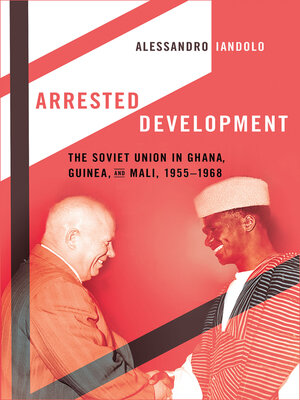Arrested Development
ebook ∣ The Soviet Union in Ghana, Guinea, and Mali, 1955–1968
By Alessandro Iandolo

Sign up to save your library
With an OverDrive account, you can save your favorite libraries for at-a-glance information about availability. Find out more about OverDrive accounts.
Find this title in Libby, the library reading app by OverDrive.



Search for a digital library with this title
Title found at these libraries:
| Library Name | Distance |
|---|---|
| Loading... |
Winner of the Marshall Shulman Book Prize of the Harriman Institute of Columbia University
Winner of the W. Bruce Lincoln Book Prize of the Association for Slavic, East European, and Eurasian Studies
In Arrested Development, Alessandro Iandolo examines the USSR's role in West Africa during the 1950s and 1960s as an aid donor, trade partner, and political model for newly independent Ghana, Guinea, and Mali.
With a strong economy in the 1950s, the USSR expanded its global outreach, supporting economic development in post-colonial Africa and Asia. Many nations saw the Soviet model as a path to political and economic independence. Drawing on extensive Russian and West African archival research, Iandolo explores Soviet ideas, sponsored projects, and their lasting impact.
Soviet specialists worked alongside West African colleagues to design ambitious development plans, build infrastructure, establish collective farms, survey mineral resources, and manage banking and trade. These collaborations—and the tensions they created—shed light on how Soviet and West African visions of development intersected. Arrested Development positions the USSR as a key player in twentieth-century economic history, reshaping global approaches to modernization.







